Key takeaways:
- Pro-life advocacy encompasses not only opposition to abortion but also support for mothers, adoption, and resources for families in need.
- Personal beliefs guide actions and can empower both advocates and those they support, fostering resilience and community through shared narratives.
- Effective communication relies on authenticity, active listening, and respectful dialogue, which can transform challenging conversations and build understanding.
- Building community support networks through outreach and shared experiences strengthens collective advocacy efforts and fosters a sense of belonging.
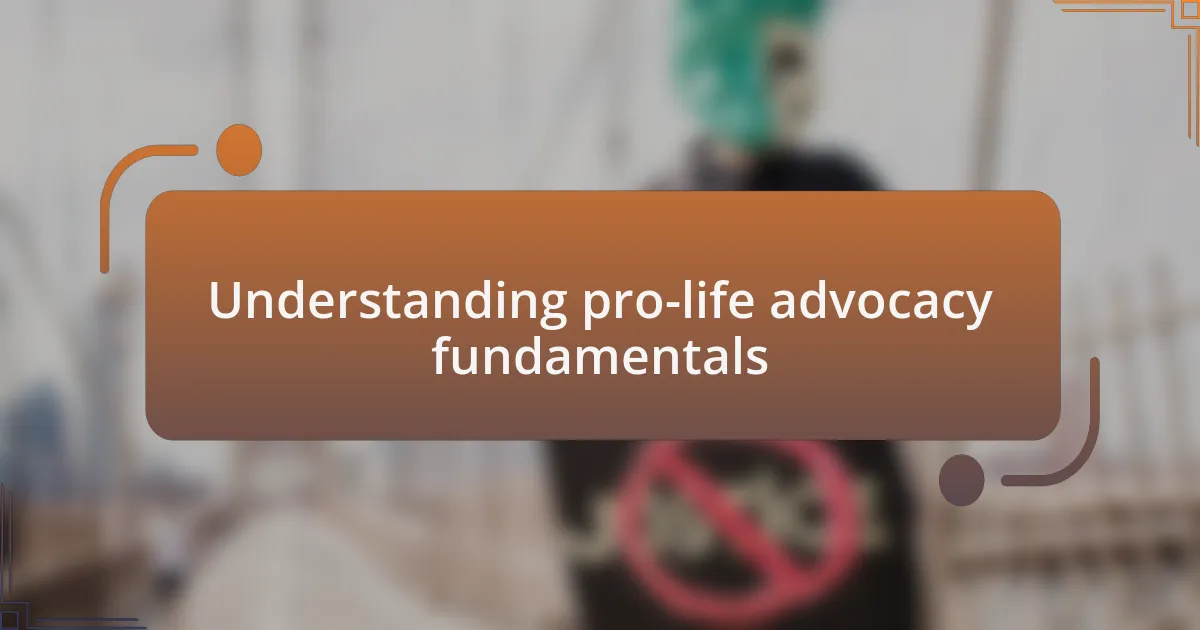
Understanding pro-life advocacy fundamentals
Pro-life advocacy centers around the belief in the intrinsic value of human life at all stages, from conception until natural death. Reflecting on my experiences at various rallies, I’ve often felt the palpable passion of individuals united in this cause, which reinforces my commitment to the movement. It raises a crucial question: what inspires such dedication in us as advocates?
Understanding the essentials of pro-life advocacy also requires recognizing the diverse perspectives within our community. I’ve met people from all walks of life who join this movement, each driven by personal stories or moral convictions. It makes me wonder—how can individual narratives shape our collective approach to advocating for life?
At its core, pro-life advocacy isn’t just about opposing abortion; it encompasses supporting mothers, promoting adoption, and providing resources for those in need. It’s about compassion and understanding the challenges many face. I’ve seen firsthand how sharing support and knowledge can change lives, not just for the unborn but for entire families. Don’t you think our role as advocates is to uplift those in vulnerable circumstances?
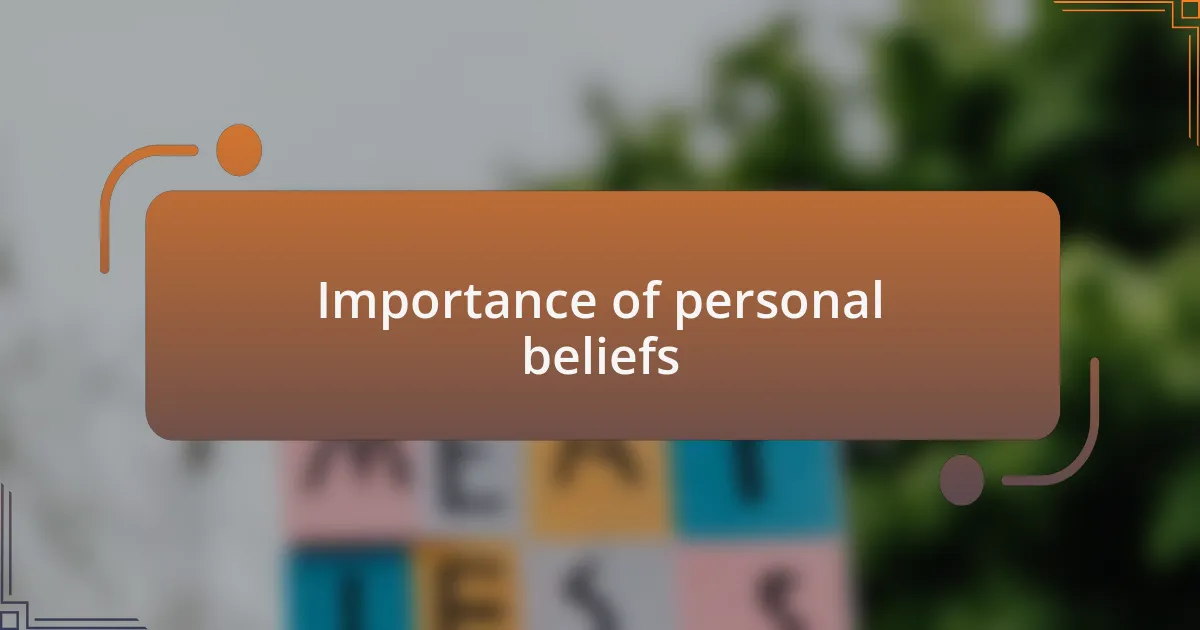
Importance of personal beliefs
Beliefs shape our actions profoundly, especially in challenging times. I recall a moment during a particularly tough rally when I paused to connect with a fellow advocate. We shared our personal stories of loss and hope, igniting a conversation that reminded us both why we fight for life. It struck me then how our collective beliefs not only validate our cause but also provide us with resilience in facing adversity.
In my journey, I’ve learned that personal beliefs act as a compass, guiding my decisions when faced with ethical dilemmas. I once spoke with a young woman who grappled with the pain of an unplanned pregnancy. Her conviction to support her unborn child, despite her fears, resonated deeply with me. It was a reminder that our beliefs can empower us and those we advocate for, offering clarity and strength when choices feel overwhelming.
The strength of our beliefs can inspire others to join the pro-life cause. When I share my own experiences, I notice how it sparks conversations that encourage others to reflect on their values. Isn’t it fascinating how a simple exchange can lead to more profound understanding? This dialogue not only fosters community but also amplifies our impact in advocating for life.
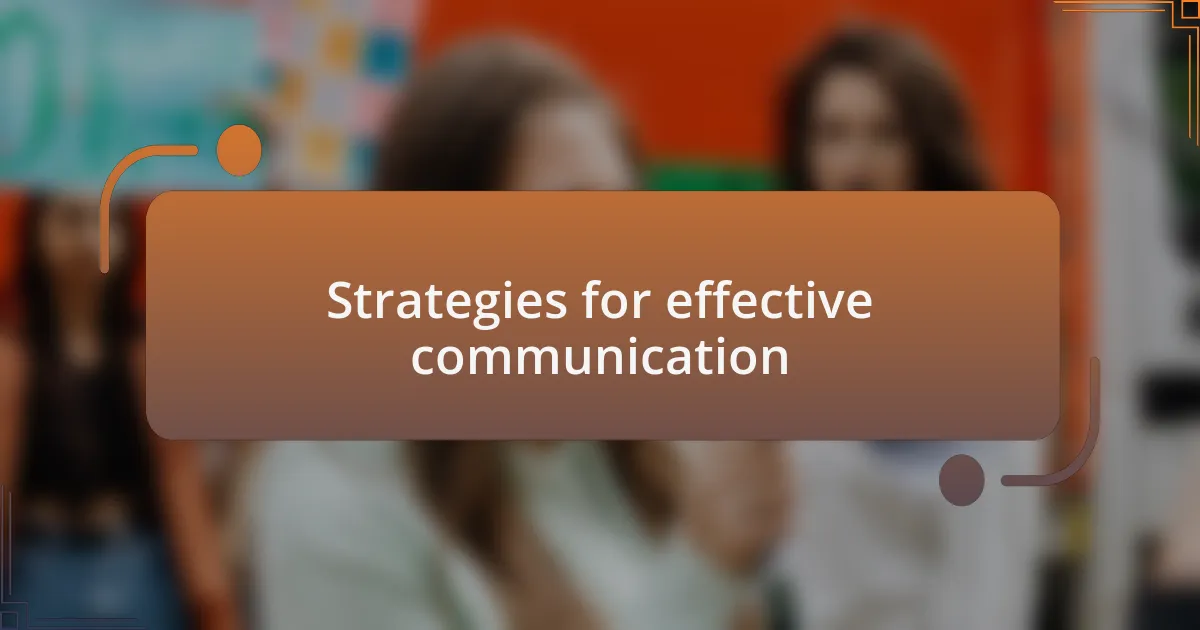
Strategies for effective communication
Effective communication in challenging times requires authenticity and vulnerability. I remember a time when I was hesitant to share my own struggles within the movement, fearing judgment. However, when I opened up about my challenges, including the moments of doubt I faced, I was met with empathy and support. It made me realize that being genuine not only strengthens connections but also encourages others to express their own truths, fostering a more robust conversation.
Listening is equally crucial in our advocacy efforts. I once attended a pro-life discussion where I made a point to actively listen to opposing views. By acknowledging their feelings and perspectives, I found common ground, which transformed a potential conflict into a meaningful exchange. Have you ever found that just hearing someone out can change the tone of a conversation entirely? I truly believe that this practice not only deepens understanding but also paves the way for more respectful dialogue.
Clarity is key when discussing sensitive topics. During a community event, I shared statistics about the emotional impact of abortion and framed it in a way that highlighted compassion rather than confrontation. By avoiding charged language and focusing on shared values, I noticed how attendees were more willing to engage. It made me think—how often do we consider our choice of words and their potential impact on listeners? Effective communication, I’ve learned, lies in our ability to connect, listen actively, and express ourselves clearly.
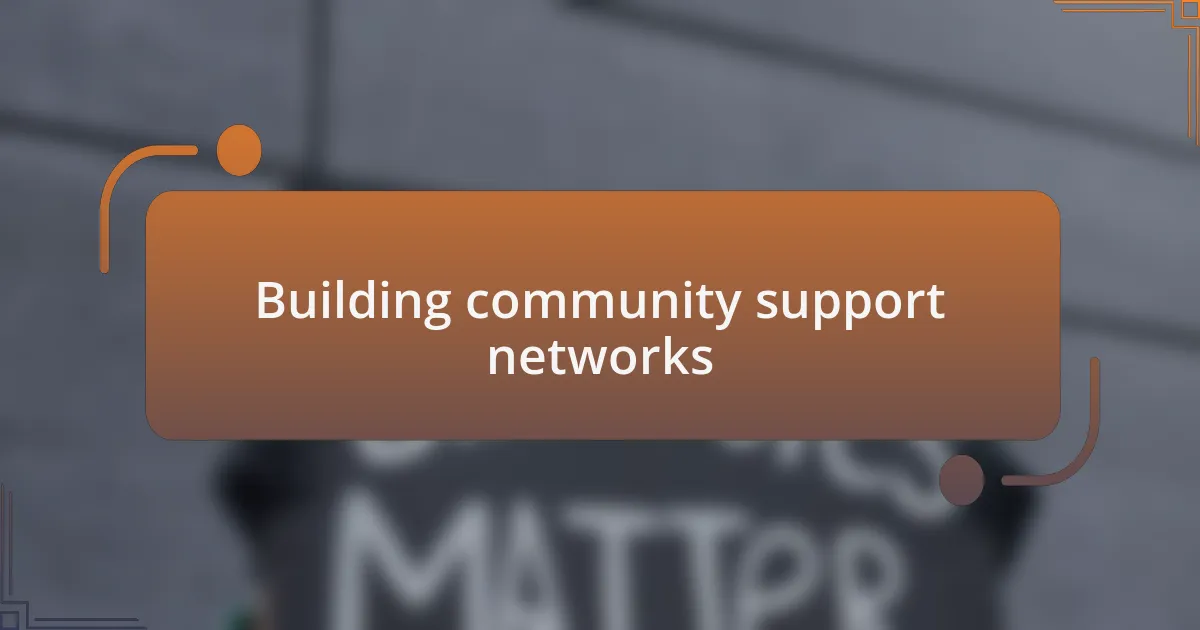
Building community support networks
Building a community support network is essential for navigating challenging times. I recall when I first joined a local pro-life group; it felt overwhelming at first, but the genuine warmth of the members was palpable. They quickly became not just allies but friends who shared similar values and struggles. Have you ever experienced that moment when you realize you’re not alone in your journey? It can be incredibly empowering.
Creating these networks isn’t just about shared beliefs, though; it’s about fostering a space where everyone feels welcomed and valued. I once organized a small gathering focused on sharing personal stories. The vulnerability exhibited was breathtaking. Each story that was shared unveiled another layer of strength in our community and sparked deeper conversations about our mission. Isn’t it fascinating how connecting over our personal experiences can solidify a group’s commitment to a cause?
To build such networks, I believe intentional outreach is key. During one outreach event, we reached out to local churches and community centers, inviting them to collaborate on initiatives. The response was overwhelmingly positive, igniting a ripple effect of support that strengthened our efforts significantly. This experience taught me that when we extend our hands to others, amazing things can happen. Have you thought about who in your community might resonate with your mission? There’s a vast network waiting to be built if we take that first step.
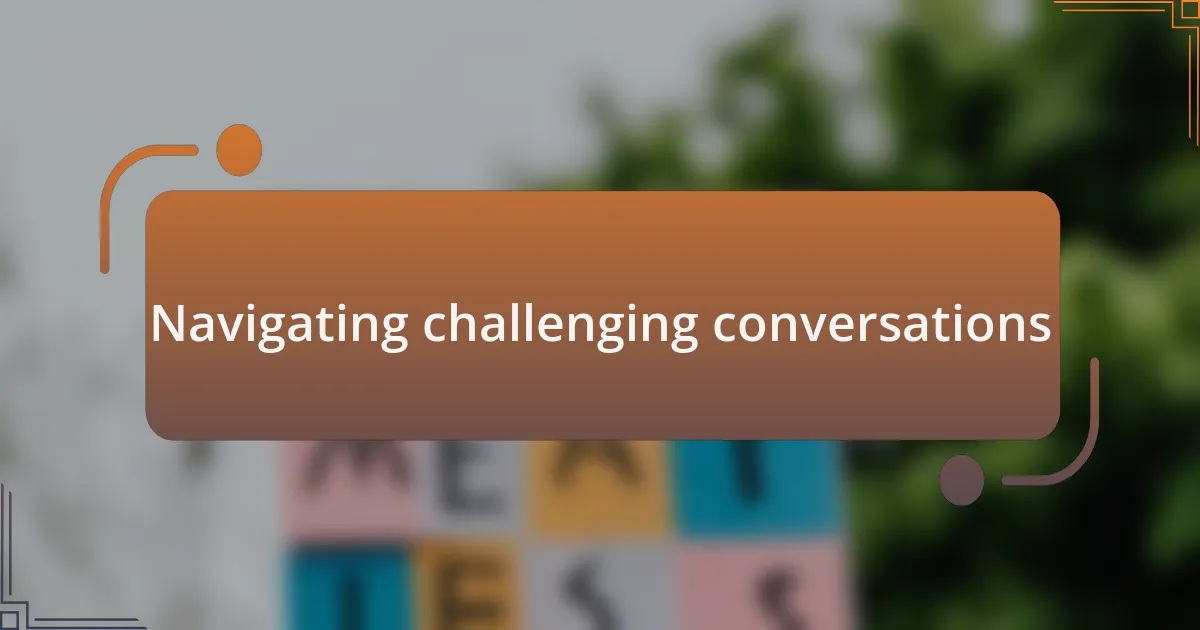
Navigating challenging conversations
Navigating challenging conversations requires a gentle approach and a willingness to listen. I remember a heated discussion about reproductive rights with a friend who held a drastically different viewpoint. Instead of arguing, I focused on understanding her perspective; it changed the tone and led to a more meaningful exchange. Have you ever paused to consider what drives someone’s beliefs? Sometimes, simply asking questions can bridge gaps and foster empathy.
I’ve found that elevating our conversations demands patience and openness. During a community forum, I encountered a woman whose experiences shaped her stance on the issue. By sharing my own narratives in a respectful manner, we created a dialogue that allowed us to connect on a human level, rather than just standing on opposite sides of a debate. Does sharing our stories make difficult discussions easier? From my experience, it definitely helps to create a common ground.
When faced with challenging topics, I advocate for maintaining a calm demeanor. There was a time when I almost lost my composure during a passionate exchange; however, I took a deep breath and focused on the bigger picture. How can we hope to inspire change without patience? By embodying a sense of calm, I noticed others around me responded similarly, allowing the conversation to evolve positively. It’s a powerful reminder that our reactions can shape the atmosphere of any dialogue.
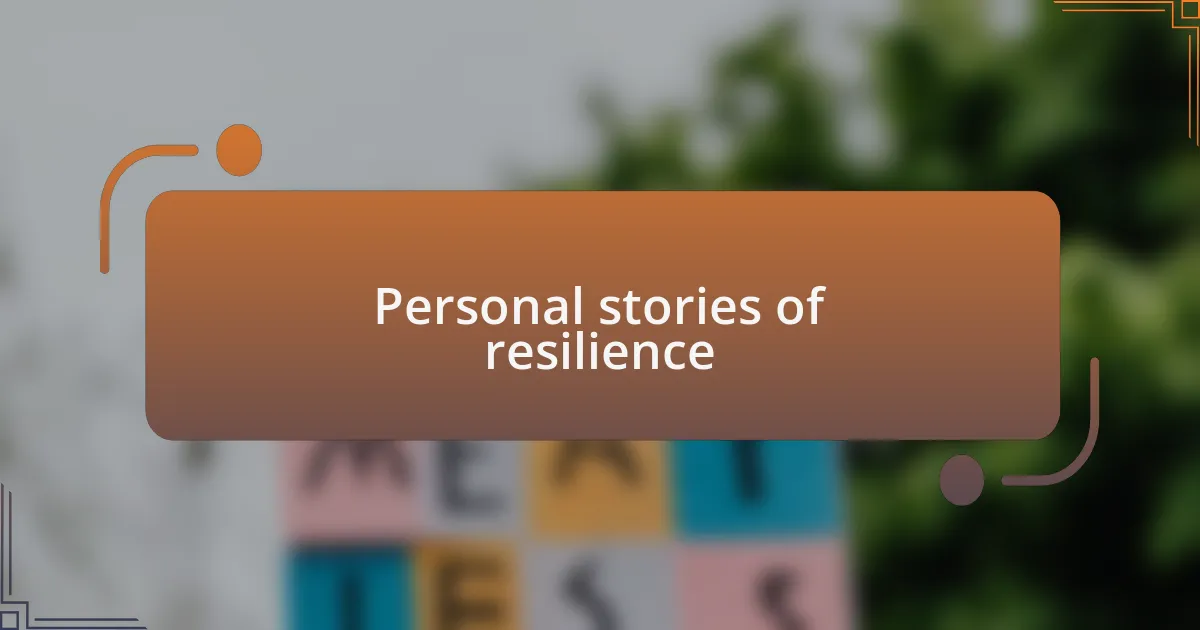
Personal stories of resilience
During my journey in pro-life advocacy, I encountered a time when I felt utterly discouraged. After attending a local meeting where the energy felt overwhelmingly negative, I decided to reach out to fellow advocates for support. Sharing our struggles and victories reminded me of the strength we build together, creating a network of resilience that fueled my determination to keep pushing forward.
I recall a personal moment that tested my resolve—the day I shared my story at a rally. As I stood before the crowd, my voice trembled, filled with fear of judgment. But the warmth and acceptance from those listening washed over me, reinforcing my belief that our open narratives can pave the way for a more compassionate dialogue. Can vulnerability transform the way we connect with others? In my experience, it certainly can.
There was a point when I faced a particularly tough setback, an important partnership falling through unexpectedly. While it was disheartening, I chose to view it as an opportunity for growth rather than defeat. Reflecting on how setbacks often lead to new paths, I redirected my focus to community outreach, enhancing my resilience and reminding me that every challenge carries the potential for something greater.
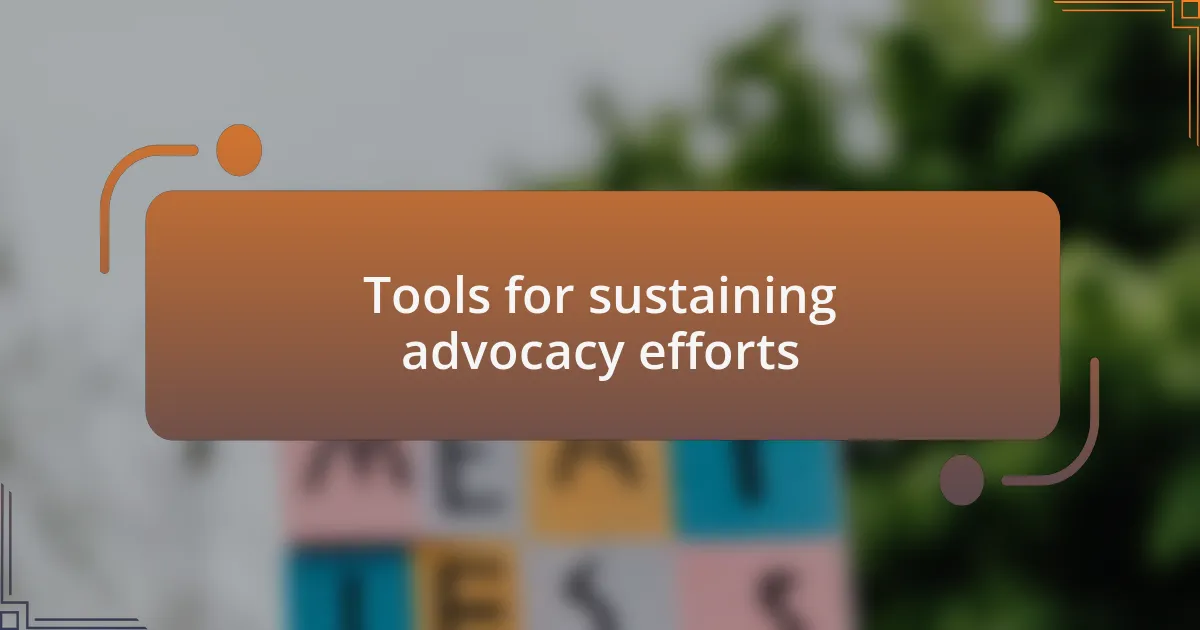
Tools for sustaining advocacy efforts
One tool that has significantly sustained my advocacy efforts is the use of social media. I remember when I first began sharing my insights and experiences online; I was hesitant, unsure of the reception. However, the power of digital platforms allowed me to connect with like-minded individuals who not only supported my journey but also amplified my voice. Isn’t it incredible how a single post can spark conversations that lead to real change?
Additionally, I’ve found that engaging in local community events is vital for maintaining momentum. There was a time when I organized a small workshop to discuss pro-life issues. The intimate setting fostered deep discussions and personal connections that revitalized my passion. Have you ever experienced a moment where you saw the direct impact of your advocacy? I certainly did that day, as the participants left inspired and equipped with tools to continue the dialogue in their circles.
Finally, I can’t stress enough the importance of self-care in this demanding landscape of advocacy. After a grueling campaign, I took a weekend retreat to recharge. Reflecting on my motivations and the bigger picture allowed me to return with renewed energy and focus. How do you ensure you don’t burn out during your advocacy efforts? For me, carving out time for reflection and relaxation has proven essential in maintaining my commitment and passion for the cause.